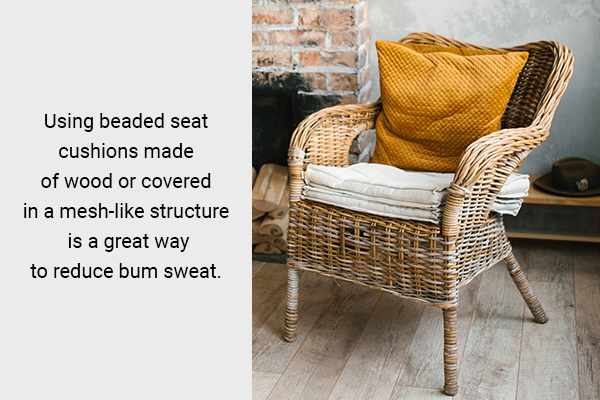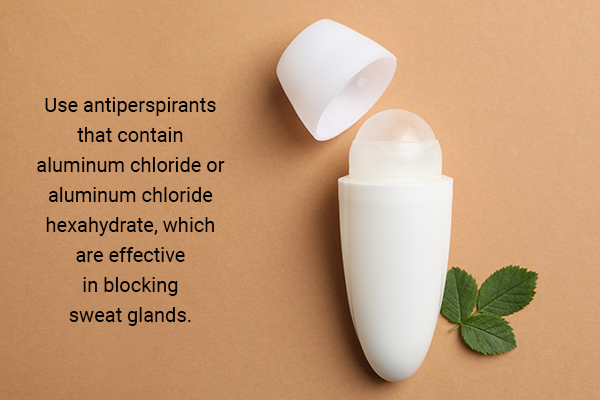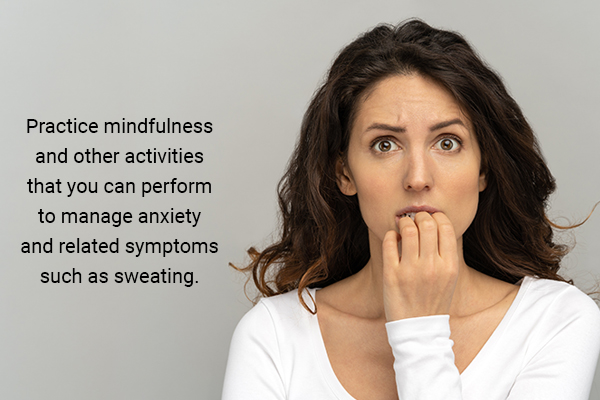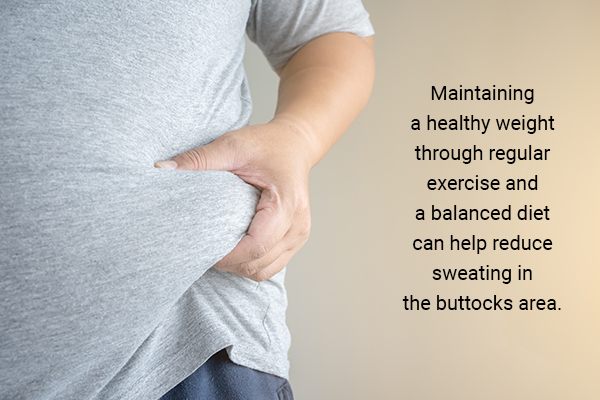In this article:
Sweating is a natural process of the human body to regulate its temperature. However, excessive sweating can cause discomfort, embarrassment, and other problems.

One such condition is bum sweat, which refers to excessive sweating in the buttocks area. It is a common problem, particularly during hot and humid weather, when sitting for extended periods, or when feeling anxious/nervous. (1)
Bum sweat can lead to skin irritation, unpleasant odor, and even infections. Therefore, it is essential to understand the causes and preventive measures to stop bum sweat on chairs.
Tips to Manage Bum Sweat on Chairs
Here are some tips to manage and say goodbye to bum sweat on chairs.
1. Choose the right fabric for your chair
Choosing the right fabric for clothing and chairs can significantly reduce bum sweat. Natural fabrics such as cotton, linen, and bamboo are breathable and can help wick away moisture.
Avoid synthetic fabrics such as nylon and polyester, which trap heat and moisture. (2)
2. Use antisweat pads on your chair
Antisweat pads or sweat guards can be placed on chairs to prevent sweat stains and odor. These pads are made of absorbent materials and can be disposed of after use.
3. Use wood-based seat cushions

Using beaded seat cushions made of wood or covered in a mesh-like structure is a great way to reduce bum sweat. The beaded cushions have gaps between the ornaments that promote air circulation, thus reducing the buildup of sweat on the buttocks.
4. Wear the right breathable underwear
To reduce buttock sweat, wear underpants made of breathable and porous material. Different types of breathable materials are available for undergarments, with cotton being a popular choice.
Cotton is gentle on the skin and comfortable to wear. Its porous nature helps to prevent buttock sweat by allowing air to circulate, keeping the buttocks cool and comfortable. (2)(3)
5. Sit on breathable chairs
Sitting on breathable chairs, such as those made of mesh or perforated materials, can significantly reduce bum sweat. These chairs allow for air circulation and ventilation, reducing the buildup of heat and moisture.
6. Apply antiperspirants to the buttocks (but not deodorants)

Antiperspirants can be applied to the buttocks area to reduce sweating. Look for antiperspirants that contain aluminum chloride or aluminum chloride hexahydrate, which are effective in blocking sweat glands. (4)
However, note that some antiperspirants may cause skin irritation or allergic reactions. It is recommended to do a patch test first before applying it to a larger area of the skin.
It is also important to avoid using deodorants on the buttocks, according to experts.
7. Wear panty liners
Wearing panty liners can be a helpful solution for women dealing with bum sweat. However, it is not recommended to wear them all day, every day, as they can trap moisture.
Using panty liners occasionally, such as during hot weather or when going out, can help keep underwear dry. (5)
It’s important to choose high-quality panty liners, as the cheap ones can be destroyed by sweat and become difficult to remove.
8. Use talcum powder on the chair
According to dermatologists, the use of powders such as talcum powder or cornstarch can help absorb moisture and prevent skin irritation caused by bum sweat. However, they warn against using powders that contain fragrances or talc, as they can cause further irritation.
9. Manage emotions better

Feeling anxious or nervous can lead to bum sweat. Therefore, it is important to practice mindfulness and other activities that you can perform to manage anxiety and related symptoms such as sweating. (1)
10. Change positions when sitting
Sitting in one position for a long time can cause your buttocks to sweat more. When you sit for too long, the air does not circulate through your groin area, causing your buttocks to become warm.
As a result, the sebaceous glands produce sweat, leading to buttock sweat. It is essential to avoid sitting in one position for a long time and to keep changing your position to reduce bum sweat.
Also, when sitting for long hours, try standing up and walking around for a few minutes whenever possible. This will help your buttocks get some air and reduce sweating.
11. Avoid eating too spicy and acidic foods
To prevent excessive sweating, avoid consuming foods that are known to cause sweating. Spicy foods, such as peppers, can cause sweating, so it is recommended to limit their intake. (6)(7) Additionally, acidic foods can also lead to sweating and hence should be avoided.
Everyone is different, so it’s important to pay attention to what triggers excessive sweating for you and avoid those triggers on days when you are more likely to sweat.
12. Seek treatment if you suffer from hyperhidrosis
According to gastroenterologists, excessive bum sweat can also be a sign of certain medical conditions such as hyperhidrosis, which is characterized by excessive sweating in specific areas of the body. They recommend seeking medical attention if bum sweat is persistent and severe. (8)
13. Maintain a healthy weight

Obesity may be a significant risk factor for excessive sweating. Maintaining a healthy weight through regular exercise and a balanced diet can help reduce sweating in the buttocks area. (9)
Most-Asked Questions
Is bum sweating a medical condition?
Bum sweating is not a medical condition but can be a symptom of certain medical conditions such as hyperhidrosis. (8)
Can tight clothing cause bum sweat?
Yes, tight clothing can trap heat and moisture, leading to bum sweat.
Final Word
Bum sweat can be an embarrassing issue for many, and if you have experienced it too, know that it is normal and nothing to be ashamed about. Moreover, there are simple measures you can take to control it, as shared in the article above.
However, it is essential to seek medical attention if bum sweat is persistent and severe or if it is accompanied by other symptoms such as itching, redness, or pain.
- Was this article helpful?
- YES, THANKS!NOT REALLY


